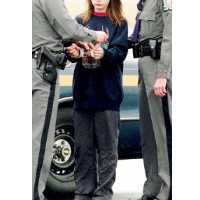U.S. Schools Reversing Get-Tough “Zero Tolerance” Policy
 (photo: Schmalz, AP)
(photo: Schmalz, AP)
Some of the largest school districts in the United States are moving away from two decades of “zero tolerance” policies that resulted in thousands of students being arrested and dropping out. Instead, education officials are trying to help at-risk kids avoid trouble and stay in school.
The shift away from “get tough” policies, first developed in the 1990s as part of the war on drugs, has taken place in Los Angeles, Baltimore, Chicago, Denver and most recently Broward County, Florida, home to Fort Lauderdale.
“What you see is the beginning of a national trend here,” Michael Thompson, director of the Council of State Governments Justice Center, told The New York Times. “Everybody recognizes right now that if we want to really find ways to close the achievement gap, we are really going to need to look at the huge number of kids being removed from school campuses who are not receiving any classroom time.”
Education leaders in Broward—which boasts the sixth largest public school system in the U.S.—realized two years ago that they needed to rethink their strategy for dealing with troubled youths after the school district led all others nationally in arrests (more than 1,000 in 2011).
Most of the arrests were for misdemeanors, such as marijuana possession or spraying graffiti.
“A knee-jerk reaction for minor offenses, suspending and expelling students, this is not the business we should be in,” Robert W. Runcie, the Broward County Schools superintendent, told the Times. “We are not accepting that we need to have hundreds of students getting arrested and getting records that impact their lifelong chances to get a job, go into the military, get financial aid.”
Broward schools are now putting more resources in student counseling and other help to keep kids from getting into trouble. As part of this effort, they teamed last month with the juvenile justice division, local law enforcement agencies, and various civil rights groups, including the NAACP, to restructure its disciplinary approach with a de-emphasis on punishment. The new strategy sends first-time student offenders of certain non-violent crimes to counseling and community service, rather than to jail and court. Those guilty of lesser infractions are required to attend a three-day program to address the problem.
So far, the plan has been working, with school-based arrests dropping by 41% and suspensions down by 66%.
Across the nation, the majority of the students in need of this kind of assistance are from minority groups, with 70% of students involved in arrests or referrals to court being black or Hispanic.
-Noel Brinkerhoff
To Learn More:
Seeing the Toll, Schools Revise Zero Tolerance (by Lizette Alvarez, New York Times)
L.A. Schools Will Stop Kicking Kids out for Being Defiant (by Ken Broder, AllGov California)
Thousands of Florida Students Arrested Annually for Actions that Used to Merit a Trip to the Principal’s Office (by Noel Brinkerhoff, AllGov)
- Top Stories
- Unusual News
- Where is the Money Going?
- Controversies
- U.S. and the World
- Appointments and Resignations
- Latest News
- Musk and Trump Fire Members of Congress
- Trump Calls for Violent Street Demonstrations Against Himself
- Trump Changes Name of Republican Party
- The 2024 Election By the Numbers
- Bashar al-Assad—The Fall of a Rabid AntiSemite






Comments